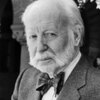Fritz Stern (1926–2016)
Author of The Varieties of History: From Voltaire to the Present
About the Author
Fritz Stern was born in the former German province of Silesia (now in Poland) on February 2, 1926 to a prominent family that had converted from Judaism to Christianity. The Sterns felt increasingly threatened by Hitler's reign and left for New York in 1938. He received an undergraduate and master's show more degree and Ph.D. from Columbia University. He taught at Columbia University for more than 40 years, specializing in European history, before retiring in 1997. He wrote several books during his lifetime including The Politics of Cultural Despair, The Failure of Illiberalism, and Five Germanys I Have Known. He occasionally advised government officials including British Prime Minister Margaret Thatcher on German reunification in the early 1990s and held government positions like being appointed a senior aide to Richard Holbrooke, the U.S. ambassador to Germany, in 1993. He died May 18, 2016 at the age of 90. (Bowker Author Biography) show less
Works by Fritz Stern
Gold and Iron: Bismarck, Bleichröder, and the Building of the German Empire (1977) 316 copies, 3 reviews
The Politics of Cultural Despair: A Study in the Rise of the Germanic Ideology (1961) 224 copies, 1 review
No Ordinary Men: Dietrich Bonhoeffer and Hans von Dohnanyi, Resisters Against Hitler in Church and State (2013) — Author; Author — 112 copies, 1 review
Friedenspreis des Deutschen Buchhandels. Ansprachen aus Anlass der Verleihung / Fritz Stern: 1999 (1999) 2 copies
Lessons from German History 1 copy
Tagged
Common Knowledge
- Legal name
- Stern, Fritz Richard
- Birthdate
- 1926-02-02
- Date of death
- 2016-05-18
- Gender
- male
- Nationality
- USA
Germany (birth) - Birthplace
- Breslau, Germany
- Place of death
- New York, New York, Etats-Unis
- Places of residence
- Breslau, Germany (birth)
New York, New York, USA - Education
- Columbia University (History|PhD|1953)
- Occupations
- historian
university professor
academic administrator - Relationships
- Sifton, Elisabeth (spouse)
Holbrooke, Richard (student) - Organizations
- Deutsche Akademie für Sprache und Dichtung
Columbia University - Awards and honors
- Friedenspreis des deutschen Buchhandels (1999)
Grand commandeur de l'ordre du Mérite de la République fédérale d'Allemagne (2006)
Université d’Oxford (Docteur honoris causa, 1985)
New School for Social Research, New York (Docteur honoris causa, 1985)
Université Columbia, New York (Docteur honoris causa, 1997)
Université de Breslau (Docteur honoris causa, 2002) (show all 7)
Université d'Oldenburg, Allemagne ( (Docteur honoris causa, 2002)
Members
Reviews
Lists
Awards
You May Also Like
Associated Authors
Statistics
- Works
- 15
- Members
- 1,548
- Popularity
- #16,637
- Rating
- 3.9
- Reviews
- 12
- ISBNs
- 73
- Languages
- 7
- Favorited
- 1
















The main themes of the book are how finance and politics became intertwined in those years, and very much through the persons of Bleichroeder and Bismarck; and the fall and re-arising of anti-Semitism during those years, and again how these two characters played such important roles in that process too. And of course these themes are coupled. The new anti-Semitism saw Jews as powerful; Bleichroeder was proof.
Stern transposes the literary matrix: the letters each belong to a moment in time, and many, I expect, pulled in strands from many facets of the situation of that moment. Stern largely dedicates a chapter to each facet, revisiting the same stretch of time in each chapter while isolating one strand or another. Probably the key chapter for the anti-Semitism chapter is the one on Rumania. In 1978 anti-Semitism was in sufficient retreat that a treaty could be forced on Rumania that required them to emancipate their Jews. But within a few years, Rumania had shirked this duty and was never held accountable.
Sad to say, this book seems more relevant today than when it was published. Various economic difficulties plagued the working class in the 1870s and 1880s; the old aristocracy could unite with the craftsmen and shopkeepers against the liberals and capitalists, under the banner of anti-Semitism. Of course Stern had no need to dwell on the parallels with the 1930s. I imagine he would have been surprised to see those passions reignited in the 2016 time frame.
I am not so familiar with Bismarck's chancellorship and all the events during those years. This book doesn't really tell the big story. Occasionally Stern will take a few paragraphs to sketch some piece of it, but mostly we just see the grand march from the point of view of a few players. Indeed, Stern reminds us several times that in the middle of events, the players don't have that hindsight that we have many decades later. Personally I like to learn about the big things from the perspective of the small things. Other readers may get frustrated. It's not a book for everyone! But the rich detail here is really a treasure if you don't mind getting lost in the details!… (more)